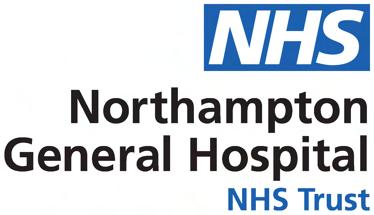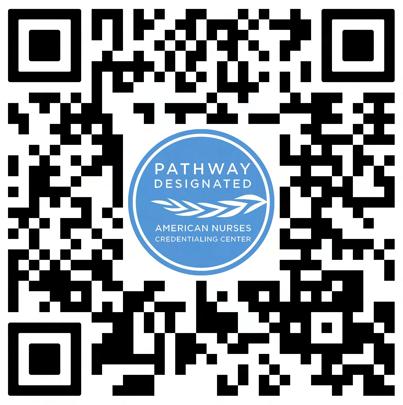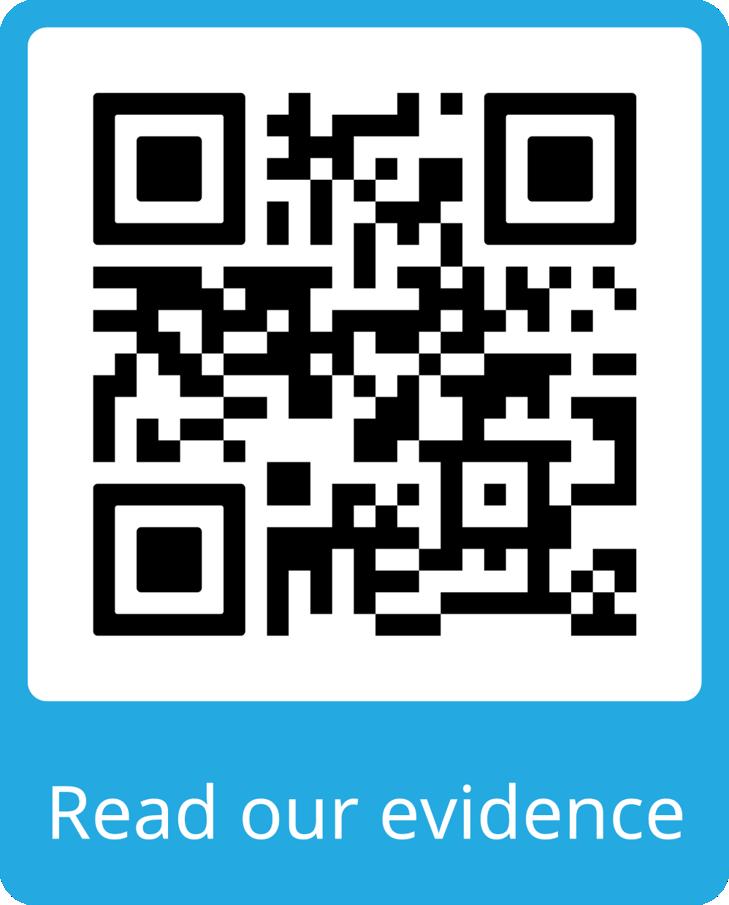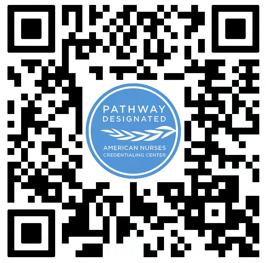

Northampton General Hospital Emergency Ambulance PATHWAY TO EXCELLENCE SURVEY TOOLKIT 2023





PATHWAY TO EXCELLENCE SURVEY SCAN HERE SURVEY LINK https://bit.ly/PathwaySurvey2023 24



Contents Welcome from Nerea Odongo, Director Of Nursing, Midwifery and Allied Health Professionals 3 What is Pathway to Excellence? 4 What does Pathway to Excellence Designation do for me? 5 How Pathway to Excellence improves life at NGH 6 How to complete the Pathway to Excellence Survey 8 Frequently asked questions 10 Glossary 15 Six Standards infographics 18 Scan here to complete your survey 2
Welcome from Nerea Odongo, Director of Nursing, Midwifery and Allied Health Professionals

I am proud to be working for a hospital which has international accreditation for Pathway to Excellence. This shows our commitment to making our hospital a positive environment, where our nurses, nursing associates and all colleagues can flourish.

It has been four years since we received our Pathway to Excellence Designated status. We are proud to be the first hospital in the UK to be going for redesignation and we hope that we can continue to be recognised as a designated Pathway to Excellence organisation.
Redesignation means that we are applying to keep our Pathway to Excellence designation and shows our commitment to creating an environment where we can excel in giving safe care to our patients.
The survey opens on Thursday 25th May and will close at 1am on Wednesday 14th June 2023.
To continue to be a Pathway to Excellence Designated hospital, we need 60% of our registered nursing workforce to complete the survey, and of these 60% we need over 75% of the responses to be strongly agree or agree. These positive responses are needed to evidence that we are doing what the evidence documents we submitted says.
It’s important to remember that the Pathway to Excellence survey, is not a staff satisfaction survey. You are asked to complete the survey to validate the evidence we have provided to show that we live the Pathway to Excellence standards.
I would like to invite all of our nurses and nursing associates to take part and help us to show how our hospital continues to be Pathway proud.

This toolkit is designed to support you with everything you need to know about the Pathway to Excellence survey, and help you to understand what the survey will be like and what you may be asked.
Thank you for being a part of our Pathway to Excellence journey.
Nerea Odongo
3
What is Pathway to Excellence?
Pathway to Excellence is an international accreditation which focuses on making hospitals a positive practice environment where nurses and nursing associates flourish.

Northampton General Hospital were the first UK organisation to achieve Pathway Designation in 2018 and will be the first organisation to apply for redesignation in 2023.


Organisations can apply to achieve designation which evidence they have met six key standards over a four-year period.
To do so, they must complete the Pathway standards document which is a portfolio of evidence of how we live the six standards at NGH: Shared Decision Making, Leadership, Safety, Quality, Wellbeing and Professional Development. The American Nurses Credentialing Center (ANCC) have approved our evidence and now nurses and nursing associates will be invited to complete a survey to validate our evidence. You can read the full portfolio by scanning the QR code below.
The only way we can achieve redesignation and keep our Pathway to Excellence Hospital status, is to evidence how amazing our nurses and nursing associates are by passing the Pathway to Excellence Survey.
To pass the survey, we must achieve a 60% response rate and score above 50% favourable on 28/28 questions, and above 75% favourable on 21/28. To count as a favourable response, the answers need to be agree or strongly agree.
The survey is an opportunity for our nurses and nursing associates to have their hard work over the last four years recognised nationally.
If we are successful in the redesignation, we will be the first hospital in the UK to have been able to maintain Pathway to Excellence designation and the first group of nurses in the UK to have the opportunity to gain redesignation status.
Read our evidence 4
What
does Pathway to Excellence Designation do for me?

Pathway to Excellence Designation impacts on everyone in the hospital, not just our nursing workforce.

It shows to our nursing teams and the hospital that as an organisation we demonstrate a commitment to creating the foundations of a healthy workplace for staff.

The ANCC Pathway to Excellence Framework depicts the six standards that are essential elements in developing a positive practice environment for nursing.
Shared Decision-Making creates opportunities for direct care nurses to network, collaborate, share ideas, and be involved in decision-making.
Leadership supports a shared governance environment by ensuring that leaders are accessible and that they facilitate collaborative decision-making. This standard also emphasizes leadership development, orientation, retention, accountability, and succession planning.
Safety prioritizes both patient and nurse safety, and fosters a respectful workplace culture free of incivility, bullying, and violence.
Quality is central to an organisation's mission, vision, goals, and values, and is based on person and family-centred care, evidence-based care, continuous improvement, and improving population health.
Wellbeing promotes a workplace culture of recognition for the contribution of nurses and the healthcare provider team. Additionally, this standard provides staff with support and resources to promote their physical and mental health.

Professional Development ensures that nurses are competent to provide care and provides them with mentoring, support, and opportunities for lifelong learning.
Living the Pathway Standards and being a designated organisation influences things such as employee turnover, job satisfaction and engagement, productivity and teamwork, nursing-sensitive quality indicators, errors and safety events, and patient satisfaction.
5
How Pathway to Excellence improves life at NGH?
When Pathway Standards are encultured throughout an organisation, the nurses, the patients, the organisation itself, and the community it serves, all benefit.

Since gaining Pathway to Excellence Designation for the first time in 2018 we have:
Decreased our vacancy rate by 11% compared to 2015. We now have fewer vacancies and more staff in nursing roles.
Increased the number of people who have access to training meaning an improvement in our education levels. In 2023, 72.9% of our nursing workforce have been able to gain a degree or higher. This is compared to 51% in 2018.
We have 40 Shared Decision Making Councils in a variety of disciplines across the organisation. These councils help to improve life at NGH for colleagues, patients and visitors.
Wellbeing days / weeks in Child Development Centre have been really fun
To celebrate the coronation, Benham’s SDM council put on a special afternoon tea event, for all our staff, doctors, stroke nurses and our neighbouring rehab ward Allebone Thank you to our SDM for this special treat to enhance staff wellbeing
The Motivation/Wellbeing week in Gynae Theatres. Boosting staff morale whilst focusing on staff wellbeing
Knightley ward have implemented multi-disciplinary teams. A great example of inter-professional decision making!
Talbot Butler ward and their SDMC celebrated the coronation with its staff and patients, lots of goodies to munch on through the bank holiday weekend and even scones and Shloer handed out to all patients and staff on the day
The BEACH huddle on Eleanor ward and the staff wellbeing box that has been implemented in order for staff to have a quick snack, period pads, sweets,body spray etc
6
How Pathway to Excellence improves life at NGH?

The Collingtree A council have created language cards to support patients. The implementation of this will be so beneficial to all patients and can be adapted to each ward area
The Cultural day organised by International Shared Decision Making Council which was a great Success and a nice initiative... We received a lot of positive feedback from the entire team in the hospital
Main Theatre Recovery staff undertake an 8 week placement on Critical Care to improve our skills, which in turn helps us when we have L2 patients in Recovery. It also means we can go and assist in Critical Care.
When we are moved to assist we are usually "buddied up" with a Critical Care nurse for support.
The roll out of student information folders starting with inpatient ward areas
The nurses on Nye Bevan asked for a hands on practical session on chest drains so that’s what we delivered! Another example of how our direct care nurses have input into the educational offerings at NGH. Our medical colleagues joined us, too!
‘Gynae theatres SDM is brilliant!’ They recently launched their National Lockery initiative. People can buy a locker number to be bought into a draw to raise money for their area. It gets the team excited and motivates them! The team have many other wellbeing initiatives, too!
We have a team of qualified nursing associates who have been given the support and opportunities to gain their qualifications and experience
The internal nursing apprenticeship has supported many colleagues to become registered nurses or nursing associates
We have the Career Café which has supported people to further their education and take on new challenges such as becoming a DoN fellow
Gynae SDM launched a tuck shop
7
How to complete the survey
Pathway to Excellence® Instructions for Survey Respondents
Before you take the Pathway survey, please read the Pathway Nurse Survey Facts and Questions (FAQ)

Link: bit.ly/PathwayFAQs
The FAQs include tips on how to successfully complete the survey
You may take the survey using any electronic device with internet access
It typically takes 15-20 minutes to complete the survey
The survey will be open to your organisation for 3 weeks (21 calendar days).
Healthcare organisation: Northampton General Hospital
8
How to complete the survey
To complete your survey, you can use either the link below or scan the QR code:


Survey link: https://bit.ly/PathwaySurvey2023
Survey launch: Thursday 25 May 2023
Survey close: Wednesday 14 June 01.00am

SCAN HERE
9
How do we achieve Pathway to Excellence redesignation?
We need at least 60% of nurses to take the survey. This is approximately 900 nurses, so we need your voice! Of the 28 questions, at least 50% of answers must agree and of 21 questions, at least 75% of answers must agree.
Remember this survey is not a staff satisfaction survey and it is not about whether you personally have taken part in activities, but about what NGH offers to nurses as a profession.
What happens if we don’t succeed at survey?
We will lose our designation and our focus on nursing excellence.
How can you help?
Take your survey when it opens, the sooner the better. Support your colleagues who may not understand what the survey is about If in any doubt, shout! We can come to the ward and explain.
What is my role as a manager during the Pathway to Excellence Survey?


As a manager, we need you to support your nurses and nursing associates in completing their Pathway to Excellence survey.
Some ways which you can do this are:
Setting up a designated survey station with the team to enable them to undertake their survey
Supporting staff in the clinical area to have protected time to take their surveys

Having a list of NMC pins to hand as they will need this to take the survey
Creating a display board with examples of how your team implement the Pathway to Excellence standards
Having open and honest conversations with staff about what Pathway to Excellence and redesignation means (please contact us if you need support with this)
Sharing the benefits of redesignation with staff
Survey here 10
What is Pathway to Excellence?
Pathway to Excellence is an international accreditation which focuses on making hospitals a positive practice environment where nurses and nursing associates flourish. Organisations can apply to achieve designation which evidence they have met these standards over a 4-year period. To do so they must complete the Pathway standards document (a portfolio of evidence across the 6 standards: Shared Decision Making, Leadership, Safety, Quality, Wellbeing and Professional Development) and passing the Pathway to Excellence Survey.
Why is it important?
NGH were the first UK organisation to achieve Pathway designation in 2018 and will be the first organisation to achieve redesignation in 2023. The only way we can achieve redesignation and evidence how amazing our nurses and nursing associates are, is by passing the Pathway to Excellence Survey. To pass the survey, we must achieve a 60% response rate and score above 50% favourable on 28/28 questions, and above 75% favourable on 21/28. To count as a favourable response, you must agree or strongly agree.
What is the purpose of the Pathway to Excellence® survey?

The Pathway survey is an integral part of the appraisal process for organisations applying for American Nurses Credentialing Center (ANCC) Pathway to Excellence® designation. The survey invites nurses and non-nurse midwives at all levels throughout the applicant organisation to share their perceptions of the workplace environment. Responses from the Pathway Survey provide information complementary to the application materials the applicant organisation has submitted to the Pathway program.
Taking the survey is your opportunity to validate the existence of the essential elements of a positive workplace environment at your organisation. The results of the Pathway survey are a critical and integral part of the Pathway to Excellence designation. Respondents provide their perception of their workplace environment.
11
What is redesignation?
As hospitals across the world, are rapid and everchanging places, the ANCC recognise it is important the Pathway Standards are evidenced every 4 years to ensure hospitals evolve and continue to strive for excellence. Following initial designation, organisations undertake the process every 4 years. NGH are the first UK organisation to redesignate.

What is the survey for?
The survey is designed to validate the Pathway evidence and ensure that our nurses and nursing associates strongly agree with the evidence submitted as being a true account of working at NGH.
How
many
minutes will it take to finish the survey?
It typically takes 15 minutes to finish the survey.
Where can I take the survey?
You may take the survey using a digital device that has Internet access.
Why does the survey ask for the last four digits of my nursing license number as a tracking number?

With online survey administrations, sometimes a respondent can accidentally submit two sets of survey answers. For quality assurance, it is important to eliminate accidental duplicate responses. The four-digit number provides the Pathway office a method for identifying and eliminating duplicate survey submissions without being able to connect them to an individual.
If I don't want to provide the last four digits of my license, can I put in a random number?
No. There is an increased potential for people to enter the same number.

12
When will it open?
Survey opens: Thursday 25th May
Survey closes: 1am on Wednesday 14th June 2023



Why should people complete it?
The survey is an opportunity for our nurses and nursing associates to acknowledge their hard work over the last 4 years. The nurses at NGH have been able to maintain Pathway to Excellence designation through the pandemic and will be the first group of nurses in the UK to have the opportunity to gain redesignation status.
How can people complete it?
Nurses and nursing associates who take the survey will be asked whether they agree with 28 statements which relate to the 6 Pathway Standards. The hospital has already submitted a 500-page document detailing nursing excellence across the trust and it is this evidence we are asking our nurses and nursing associates to validate by agreeing to the survey statements about the organisation.
Is it confidential?
It is completely confidential. When nurses and nursing associates take the survey, they will be asked to enter the last 4 digits of their NMC PIN number. This is so the ANCC can ensure there are no duplicate entries. The survey results by individual will not be shared with anyone in the hospital.
Will staff have protected time to complete the survey?
Yes. Please speak to your line manager who will be able to provide you with protected time to complete the survey.
13
How are the results reported to my organisation?
Your responses will be combined with the responses of all the other respondents in your organisation to produce a summary report. The report your healthcare organisation receives, will include only the total number of respondents who participated in the survey and the aggregate response for the survey items about the workplace environment.

How do I know I have completed the survey?
You have finished and submitted the survey only when you reach the following message: ‘Congratulations! You have successfully completed the nurse survey. You may now close the screen. Thank you for your participation.’ If you do not reach this screen, you have not submitted the survey and your results have not been collected.
Can I go backward in the survey to change my answers if I want to?
Yes, you can click the “back” button from any screen to return to previous screens.

If I cannot finish the survey in one sitting, can I return to finish it at another time?
Yes, you can click the “save” button at the bottom of any screen, and a URL will appear in the address bar at the top of the screen. Copy and email this URL to yourself. The URL will bring you back to the question in the survey you last answered.

What difference does it make whether I answer the survey or not?
Taking the survey is your opportunity to validate the existence of the essential elements of a positive workplace environment at your organisation. The results of the Pathway survey are a critical and integral part of the Pathway to Excellence designation. Respondents provide their perception of their workplace environment.
14
Glossary of terms
As Pathway to Excellence is an American accreditation, some of the statements use words that are sometimes different to the ones we use in the UK. Here is an explanation of some of the terms used:

Interprofessional Decision Making – are nurses involved in MDT discussions. For example, shared decision-making councils, board rounds
Direct care nurse – any nurse including ward managers who work at least 50% of the time with patients
Shared decision making – can nurses put forward ideas for improvements to shared decision making councils or their line manager
Ethical concerns – can nurses speak to someone if they are worried about a professional issue. For example, line manager, Professional Nurse Advocate, safeguarding team
New technology – can nurses get involved when new technology is being selected. For example, technology selection groups

Hiring process – can nurses get involved in recruitment days or interviews Shared governance committees – these include our shared decision-making councils
Nurse manager – matron or ward manager

15
Glossary of terms
As Pathway to Excellence is an American accreditation, some of the statements use words that are sometimes different to the ones we use in the UK. Here is an explanation of some of the terms used:

CNO – refers to the Director or Nursing. Our new Director of Nursing is Nerea Odongo and Debbie Shanahan is our Deputy Director of Nursing

Cost management discussions – do ward mangers have discussions with matrons about costs including the cost of items or projects on shared decision-making councils
Planned or unplanned change – For example during COVID
Patient related safety events – can nurses including ward mangers review Datix
Incivility – are nurses supported when they experience incivility
Verbal or physical abuse – does the organisation have a policy to protect nurses
Staffing decision – can ward managers provide input into staffing

Transition patients – when patients step up or down, are nurses involved in the discussions
Person centred care – do nurses try to always put patients first
Respectful communications – are sessions available through organisational development
16
Glossary of terms
As Pathway to Excellence is an American accreditation, some of the statements use words that are sometimes different to the ones we use in the UK. Here is an explanation of some of the terms used:

Educational opportunities – can nurses book onto QI or evidence based practice courses

Collaboration on Quality – can nurses work as part of the MDT to improve quality
Performance in quality – are nurses told how good the quality of care is. For example, through assessment and accreditation
Wellbeing initiatives – are nurses asked what wellbeing initiatives they would like
Work schedules – do we have rostering rules to help with staff wellbeing
Staff recognition – are staff recognised for good work. For example, Tearrific Tuesday, Daisy wards, star of the month
Adverse work-related event – are nurses supported after a serious incident

Physical fatigue – are nurses given time and space for rest breaks
Educational offerings – can nurses ask for specific training
Professional development activities – can nurses attend development days and training days and are these funded
17
Pathway to Excellence Survey

Shared Decision-Making
Creates opportunities for direct care nurses to network, collaborate, share ideas, and be involved in decision-making.

Questions you may be asked
The organisation promotes a culture of inter-professional decision making
At this organisation, direct care nurses have opportunities to influence decisions about nursing practice through shared decision-making
The organisation has a process for nurses to address ethical concerns
What does this mean?
Making decisions/ working as part of an MDT (e.g. nurses, support workers, AHP's
Some examples of how this is lived
SDM Councils, Shared Governance (Bronze, Silver, Gold), NMAHP Board. Examples: Fit council, IPC taken to Bronze, Deconditioning games- Allebone and ED
Do we have Shared Decision Making councils at NGH
If you were concerned about something (e.g. a workplace, safeguarding or patient issue) are there places for you to escalate this
Some examples of our 40 SDM Council projects: Coll A language sheets, Gynae Theatres wellbeing week, Finedon world kidney day, Creaton Patient TVs, etc.
PNA Service, Safeguarding, (Bronze, Silver, Gold), FTSU, Line Manager, Matron, Connect, Explore, Improve, Ask Heidi

This organisation makes sure that direct care nurses are represented in the interprofessional discussions about selecting new technology
At this organisation, direct care nurses have input into the hiring process of new staff
Nurses are included in the multi-disciplinary team decisions about new technology (e.g. EPR)
SDM Councils, Interprofessional Project Groups. Examples: Tendable, Careflow, EPMA.
Nurses are involved in recruiting new staff
How can you evidence these things in your area?
Recruitment days examples: hospital wide, recruitment days. Inclusive Recruitment Champions
Nurses & nursing associates please scan the QR code to take the survey

Northampton General Hospital
18
Pathway to Excellence Survey




Leadership
Supports a shared governance environment by ensuring that leaders are accessible and that they facilitate collaborative decision-making. This standard also emphasizes leadership development, orientation, retention, accountability, and succession planning.
Questions you may be asked
The CNO is accessible to direct care nurses
What does this mean?
Some examples of how this is lived
Nurses can access and talk to the Director of Nursing, Nerea Odongo
Nurse managers in this organisation make accommodations for direct care nurses to participate in shared governance committees
Nurse managers in this organisation include direct care nurses in cost management discussions
At this organisation, direct care nurses feel supported by leadership during periods of planned or unplanned organisational change
Nurse managers in this organisation are accessible to direct care nurses

Nurses are supported to be on Shared Decision Making councils
Beginners brunch, leaders’ lunch, LFE's, afternoon tea, attends preceptorship and PD development programme, 1-1's, email, shadowing, daily ward visits, leadership council, NMB. Examples: DON fellows and new nurses
Shared Decision Making councils being active evidence this. SDM Standard Operating Procedure and protected time
Matrons include staff when trying to save money or decide on new things
SDM Councils, cost improvement projects, selecting new equipment, equipment trials, rep visits. Examples: Gosset staff room, Mouthcare packs Critical Care
Do we have support in place for nurses when things change unexpectedly
Connect, Explore, Improve, major incident, training, wellbeing support (e.g. SOS, PNA, Trim), communications, ward visits. Examples: Fire and Director of Nursing transitions
Nurses can access their Matron
Open door, coffee and tea visits, daily ward walks, cover, team days
How can you evidence these things in your area?
Nurses & nursing associates please scan the QR code to take the survey

Northampton General Hospital
19
Pathway to Excellence Survey


Safety
Prioritises both patient and nurse safety, and fosters a respectful workplace culture free of incivility, bullying, and violence.
Questions you may be asked
This organisation safeguards nurses from verbal or physical abuse from patients and families
At this organisation, direct care nurses are involved in addressing patient-related safety events
At this organisation, interprofessional decision-making is used in the process to transition patients from one level of care to another
Direct care nurses in this organisation have input on daily staffing decisions related to changes in patient conditions, volume, or availability of qualified staff

This organisation promotes a culture free from incivility, bullying, and workplace violence among the healthcare provider team, including nurse-to-nurse
What does this mean?
Do we have process in place to reduce violence and aggression
Some examples of how this is lived
Professional Nurse Advocate service offer follow up after all violence and aggression incidents, we have a violence and aggression policy, and new no excuse for abuse campaign
Do we involve nurses in reporting incidents
Patient Safety Incident Response Framework (PSIRF), Datix, IRG
Are staff involved when we step patients up or down e.g. from ward to critical care
NEWS charts, Board rounds, Use of Ibox, Deteriorating patient task list and care plan.
Examples: Althorp, Critical Care and Gosset stepping patients up and down
Do we have processes for staff to feedback on staffing
Does the organisation encourage kindness at work
Safe Care and supporting Standard Operating Procedure- completed daily on wards twice
Values, Connect Explore Improve, PNA's, Datix, organisational development work, EDI teams, VARG. Incivility training, staff networks, freedom to speak up, violence and agression reduction group (VARG)
How can you evidence these things in your area?
Nurses & nursing associates please scan the QR code to take the survey

Northampton General Hospital
20
Pathway to Excellence Survey

Quality
Is central to an organisation's mission, vision, goals, and values, and is based on person- and centred care, evidence-based care, continuous improvement, and improving population health.
Questions you may be asked
What does this mean?
This organisation promotes a culture of person and family-centred care

Do we do things to improve patients’ experience
Some examples of how this is lived
Values, Elective Admissions, End of life care plans, bereavement support for family, volunteers, assessment on unplanned admissions, care rounds, patient passports, friends and family test, patient listening events. Examples: wedding on Finedon, using the LD passport, walk the walk, pet therapy
This organisation provides education sessions on how to engage in respectful communication among employees
This organisation communicates updates about performance in quality measures
This organisation uses interprofessional collaboration to help contribute to quality initiatives
This organisation provides direct care nurses with educational opportunities on how to apply evidence-based practice
Do we provide training on good communication for staff
OD training- courageous conversations, rainbow risk, unconscious bias, EDI training, building cultural bridges. Examples: upcoming incivility event, rainbow risk
We tell staff how good the quality of care is
We work as an multi-disciplinary team to improve quality
Assessment & accreditation, newsletters, Connect, Explore, Improve, CEO briefing, LFE, CQEG, social media
Collaborative groups e.g. pharmacy, TVN groups, Ward teams working as MDT (e.g. stroke Pathway), SDM Councils.
Are there opportunities to learn about evidence-based practice, QI or research
How can you evidence these things in your area?
EBP Course, ICA Pathway, QI, PhD.
Examples: Don fellows, EBP course, academic internships
Nurses & nursing associates please scan the QR code to take the survey

Northampton General Hospital
21
Pathway to Excellence Survey

Wellbeing
Promotes a workplace culture of recognition for the contribution of nurses and the healthcare provider team. Additionally, this standard provides staff with support and resources to promote their physical and mental health.

Questions you may be asked
This organisation supports the wellbeing of staff who experience an adverse work-related situation
This organisation asks for input from direct care nurses about what wellbeing initiatives they would like to have
What does this mean?
We have support for staff who have been involved in serious events
Some examples of how this is lived
SoS team single point of access. TRiM practitioners across the organisation. PNA service - PNA follow up all violence and aggression (VARG) related incidents to offer support.
This organisation provides nurses with opportunities to create work schedules that support nurse wellbeing
We ask people what wellbeing initiatives they would like
We have rostering rules, policies and initiatives to improve wellbeing
At this organisation, nursing leadership fosters a culture of recognition
This organisation has strategies in place to address physical fatigue experienced by direct care nurses
We recognise our staff in different ways
We have processes/ facilities to ensure staff feel rested during their shift
How can you evidence these things in your area?
Wellbeing initiatives survey. Our Space opening soon. Brew buddy supports areas. Free drink and cake voucher for all staff. Ability to support staff with 1:1 talking - PNA service supporting staff with this. Single point of access for health and wellbeing team. Shared Decision Making councils also support wellbeing.
SoS team single point of access. TRiM practitioners across the organisation. PNA service - PNA follow up all violence and aggression (VARG) related incidents to offer support. PNA team also linking to patient safety team to support staff involved in serious incidents for support
Agile working policy promote flexible work schedules to suit our nurses and prioritise their wellbeing. Agile working patterns and request forms. Self-rostering trial with feedback, with ability to share. Flexible shift duration including start and finishing timest
Fostered through individual shared decision making councils. Many have developed their own recognition awards. Examples: star of the month oncology. Tea-rific nominations via the street. Daisy, team CNO silver award.
Our space opening to provide an area to relax away from work environments open 24 hours per day. Agile working/shift requests enabling staff to have breaks between shifts. 24/7 food available in Eat Street.
Nurses & nursing associates please scan the QR code to take the survey

Northampton General Hospital
22
Pathway to Excellence Survey




Professional Development
Ensures that nurses are competent to provide care and provides them with mentoring, support, and opportunities for lifelong learning.
Questions you may be asked
This organisation prepares nurses to competently provide care if they are assigned to an area other than their primary area

Direct care nurses have input into the selection of educational offerings provided by this organisation
What does this mean?
How are nurses prepared when re-allocated to another ward/area
Some examples of how this is lived
Following the code, following their competencies, looking at transferable skills, Clinical Skills Programme and updates. Medical study day for the surgical nurse, medicine skills programme for the surgical nurse and any requested development activity
How do nurses at NGH decide what they need to develop their role
Make an educational wish to PPD, ward managers complete training needs analysis. Cup of Tea with PPD, career talks with PPD, clinical education prospectus, appraisals, 1:1 with managers
This organisation supports the direct care nurse to participate in professional development activities.
How are nurses supported to undertake development and how are they made aware of this
Funding, release time, Cup of Tea with PPD, clinical education prospectus, Maternity Starters Programme, Career Café, 1:1 conversations with manager, appraisals
How can you evidence these things in your area?
Nurses & nursing associates please scan the QR code to take the survey

Northampton General Hospital
23


























